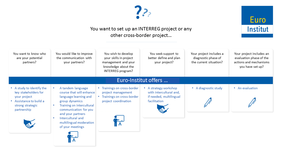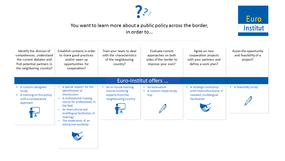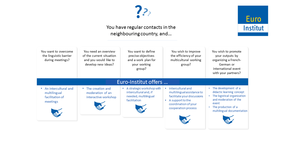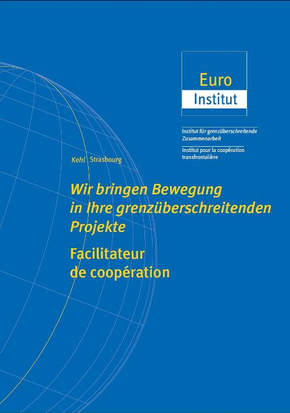The Euro-Institut for cross-border cooperation
We get your cross-border projects moving!
The Euro-Institut is a Franco-German organization created in 1993 in Kehl am Rhein. It aims at improving cross-border cooperation through training and consulting with regard to public policy. We offer:
Practice-oriented trainings
on all cross-border issues
in a comparative way on current issues
in the form of seminars, study trips, language courses...
Individual project support
from the project idea to the evaluation
to overcome intercultural barriers
with bilingual moderation of your cross-border meetings
Tailor-made studies
on feasibility, impact or evaluation
for multilingual publications
as a basis for further strategic measures
As a neutral platform, we help to develop cross-border response despite differences between legal and administrative systems, cultural or methodological backgrounds, etc. Together with stakeholders, we are developing specific tools and methods and thus contribute to capacity building on a cross-border level.
We perform short training courses, coach cross-border project teams, organize study visits or civil servant exchanges.
The Euro-Institut is active in numerous networks and supports all types of cross-border actors - administrations, NGOs or companies. The expertise and know-how that we have acquired in the Upper Rhine area allows us to work on transferable concepts which can be used in other European border regions.
Our Institute is located at Kehl near Strasbourg in the Upper Rhine. As the Euro-Institut is a french-german structure, our team is binational, bilingual and bicultural.
- To improve cross-border cooperation through continuing education and consulting with regard to public policy
- To contribute to the resolution of problems resulting from different political-administrative systems and bases
- To develop tools and methods which can be used by other cross-border territories in Europe
- Public service from France, Germany, Switzerland and other European countries
- Actors of the cross-border cooperation from the para-public and private sector
Dissemination through:
- Annual training programme
- Training sessions on request
- Conferences and publications
Examples of specific actions:
- Support to cross-border projects (for example Eurodistricts)
- Work for the Trinational Metropolitain Region of the Upper Rhine (EU green paper)
- Exchange of civil servants
- Langage courses
- Need-analysis for target groups and cross-border territories
- Enabling organisations with different backgrounds to work together – intercultural management
- Developing specific methods and instruments for training on cross-border issues
- Participating in relevant networks (Europa, MOT, PEAP, Competence center, Council of Europe, ENTO, University of administrative sciences Speyer, etc…)
- Capitalization and dissemination of know-how and best-practice solutions in Europe (Intercultural guide for the animation of cross-border meetings…)
- Providing technical assistance to other cross-border territories in Europe
German partners
- Federal State of Baden-Württemberg
- Cities of Kehl, Achern, Lahr, Oberkirch, Freiburg and Offenburg
- Ortenau District
- University of Applied Sciences, Kehl
French partners
- French State
- Region Grand Est
- Collectivité Européenne d'Alsace
- City of Strasbourg
- From 1993 to 2003: Economic Interest European Grouping (E.I.E.G.)
- Since 2003: Local Cross-border Cooperation grouping (G.L.C.T.) as defined by the Karlsruhe agreement
- First G.L.C.T. based in Baden-Württemberg




